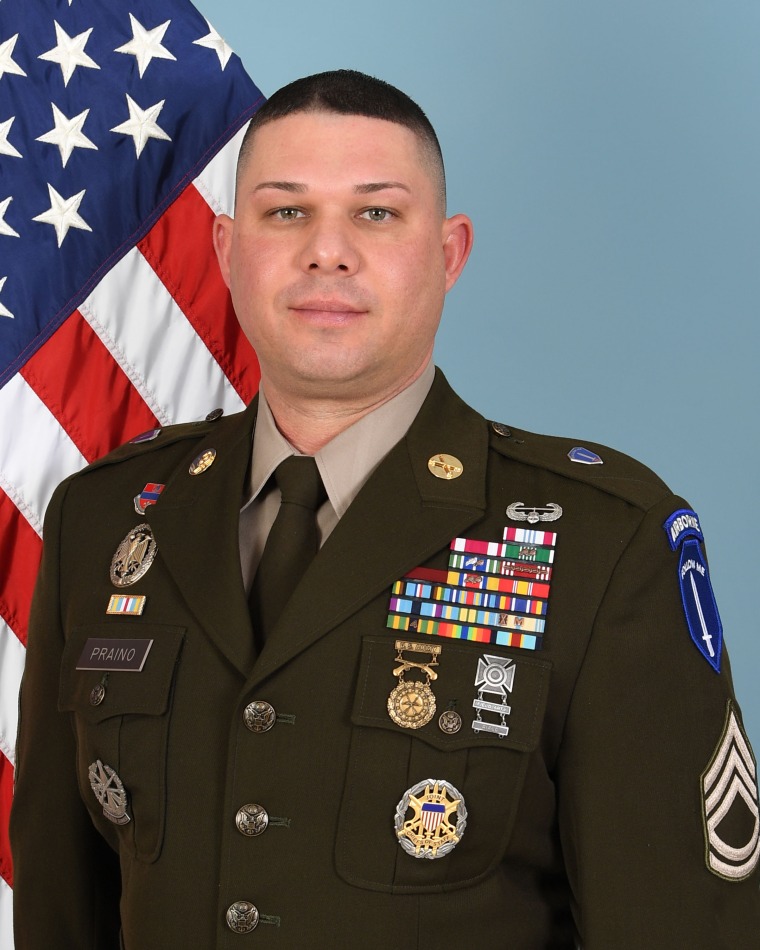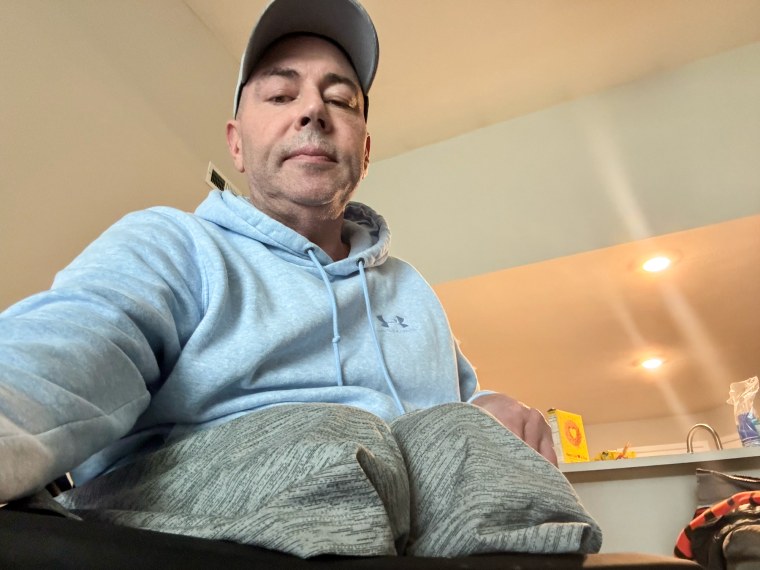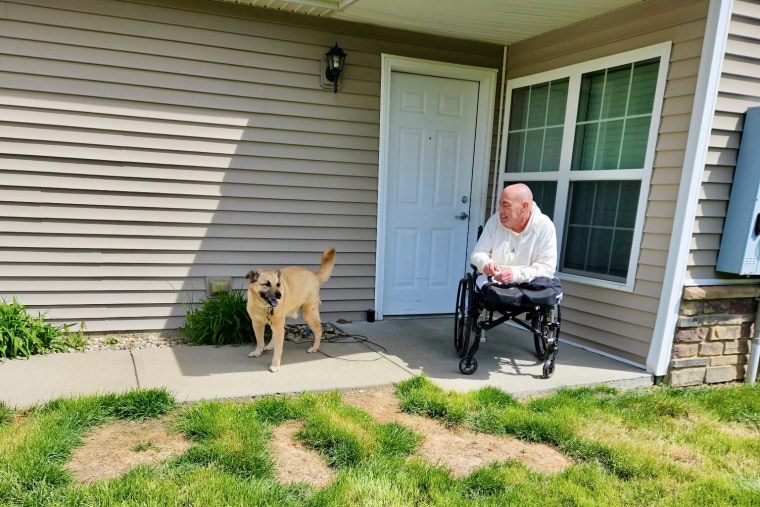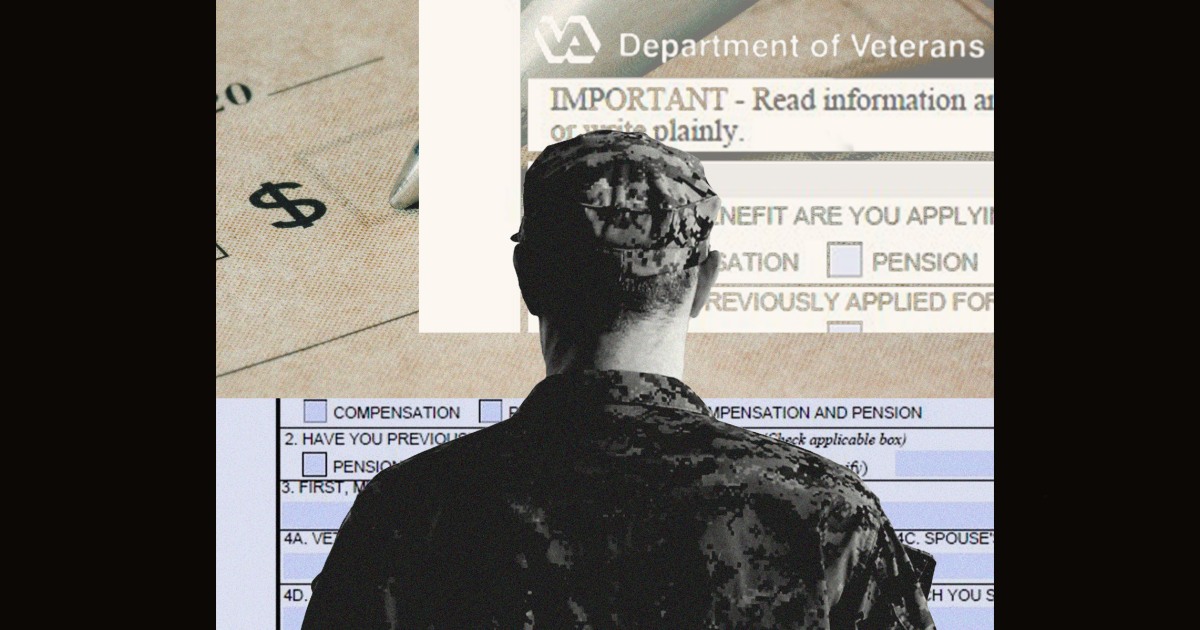Christopher Praino signed a waiver relinquishing his disability compensation from the Department of Veterans Affairs after he was ordered to active duty in fall 2019.
In a letter, the VA confirmed it would terminate his roughly $965 monthly payments because, by law, he could not receive both VA benefits and active-duty pay at the same time.
But the agency did not fully halt the payments. Instead, it sent various monthly amounts over the next three years, ranging from $0 to over $2,000, Praino’s records show.
“The VA never stopped,” he said, “after response after response, call after call, walk-in after walk-in.”
In 2023, despite Praino’s repeated efforts to rectify the inconsistent installments that should have ended years ago, the VA informed him in a letter that he owed nearly $68,000. That year, the government began automatically clawing some of the money out of his military paychecks, which he uses to support five children and his wife, leaving him in dire financial straits.
“No words can tell you the emotional, mental and physical heartache I have every day dealing with this,” he said. “It’s eating away at me.”
In a recent congressional oversight hearing focused on why the VA regularly overpays veterans and then asks for the money back, agency officials partially blamed veterans for the exorbitant errors, telling lawmakers that some veterans have been failing to report eligibility changes that would have lowered their monthly disability compensation or pension payments.
But Praino and two other veterans told NBC News they did notify the VA in a timely manner. Yet, records show the agency continued overpaying them for months, sometimes years, before asking for the money back.

The long-delayed adjustments, which can cause veterans to incur life-changing debts, may indicate another operational shortfall at the VA weeks after officials testified that the agency doles out about $1 billion in overpayments each year due to administrative errors and other factors.
The VA overpaid about $5.1 billion in disability compensation and pension payments from fiscal year 2021 to fiscal year 2024, according to Rep. Morgan Luttrell, R-Texas, who chairs the House Subcommittee on Disability Assistance and Memorial Affairs.
The issue is recurring and getting worse, Luttrell told NBC News, even as the Trump administration has cut billions of dollars in grants and slashed thousands of federal jobs in an attempt to trim what it sees as waste and inefficiency in federal spending.
“It’s not the veterans’ fault,” Luttrell said. “It’s the system that is failing.”
In a statement, VA press secretary Peter Kasperowicz said the agency, under new leadership, is “working hard to fix longstanding problems, such as billions of dollars per year in overpayments.”
Luttrell said the overpayment issue is complex, largely stemming from tiers of human error and an outdated computer system that he said does not adequately allow information to be shared between local and national VA offices.
“You have to get the software to talk to each other. You have to get the veterans to communicate. You have to get the actors inside the VA to move accordingly, and then you have to make sure the system is lined out as it needs to be,” he said. “That is such a complex problem set to solve.”
‘The processes are broken’
In 2015, after his divorce was finalized, veteran Brent Aber said he went to his local VA’s office in Akron, Ohio, to remove his ex-wife as a dependent.
“I thought, OK, all is done,” he said.
Aber said it felt like he was officially closing a difficult chapter in his life. But eight years later, another nightmare emerged when the national VA’s Debt Management Center sent him a letter, notifying him that he had to pay back more than $17,700.

Aber, who served in both the Navy and Army for a dozen years, said he called the VA to find out how he accrued this debt. He said he was told that different VA computer systems do not communicate with one another, meaning the dependent removal may have never been registered nationally, and his monthly payments had not decreased as they should have.
Kasperowicz, the VA spokesperson, disputed claims made by Aber and Luttrell about the computer systems, saying the VA has had a centralized claims system since 2013 that “ensures updated information is reflected” for each veteran. Upon follow-up, Luttrell could not be reached for comment on the VA’s dispute.
Kasperowicz did not offer an explanation as to what happened in Aber’s case and said the VA has no record of his dependent change request from 2015.
Aber said he spent more than a year fighting the recoupment and claimed financial hardship. But in May, the VA began withholding nearly $500 from his monthly compensation payments until the debt is cleared.
To make up for the loss, Aber, who lost both of his legs in a training accident and is now mostly bedridden, said he stopped using a house cleaning service and is mostly eating cheaper, microwavable food.
“I provided all the paperwork at the time of the divorce, but that didn’t seem to matter,” he said.
The 50-year-old said the VA’s recoupment hurts more as he fights for medical care.
He said he has been struggling with severe pain and swelling since he underwent revision surgery on his limbs about two years ago with the hopes of getting fitted again for prosthetics.
While Aber said his primary care doctor referred him to an orthopedic surgeon with expertise in double amputations, he said the VA denied the referral.
Kasperowicz said the “entirety of the VA Northeast Ohio Healthcare System orthopedic section” and other health care providers have evaluated Aber and “all have agreed that there are no additional surgical options that would provide him pain relief or improved function.”
“The medical consensus is to continue amputee clinic, physical therapy, pain management and behavioral health treatments to address the complexity of his condition,” Kasperowicz said.
Aber said the double battle he has been waging against the VA has left him feeling frustrated and betrayed.
“I feel like I’ve been completely done wrong,” he said.

In Bonaire, Georgia, veteran John Mullens reported a dependent change in February after his 18-year-old son became eligible for a separate VA educational benefit that provides monthly payments to cover the cost of school. By law, veterans cannot receive both benefits at the same time, which Mullens knew from his own research.
NBC News reviewed records from his VA portal, showing he filed a request to remove a dependent on Feb. 18. The claim was assigned to a reviewer on Feb. 19, the portal shows. And there were no other updates until May when Mullens received a letter from the VA, alerting him to the duplicate payments, which the VA said resulted in about $340 in overpayments each month.
“They did nothing with the information and continued to overpay me,” Mullens, 55, said. “The processes are broken.”
Kasperowicz said it currently takes an average of about 21 days for the VA to remove a dependent and an average of about 91 days to add one.
Of the nearly $1.4 billion overpaid in fiscal year 2021, Kasperowicz said about $913 million was related to dependent changes.
The VA does not track data showing how many veterans in overpayment cases actually did report changes on time, Kasperowicz said.
The overpayments sometimes span many years. In 2023, the VA temporarily suspended the collection of pension debts for thousands of low-income wartime veterans and their survivors after the agency identified an issue with its income verification that led to overpayments between 2011 and 2022.
On May 14, Luttrell and other members of the House subcommittee pressed VA officials to explain how the agency planned to fix the problem.
Nina Tann, executive director of the VA’s compensation service, testified that the agency, which serves about 9.1 million people, has a “heightened risk” of making improper payments due to the large number of beneficiaries and the high-dollar amounts it doles out.
Tann said the agency has taken steps to prevent, detect and correct the issue, including being better about notifying veterans that they need to report changes.
Tann also said the VA fixed an administrative error in January that had been causing duplicate payments for about 15,000 veterans with dependents in fiscal year 2024. The agency did not force those veterans to repay the money, she said.
Kasperowicz said the VA does not seek to recoup overpayments when administrative errors, including issues related to the VA’s online filing platform, are to blame.
But Praino, who owes almost $68,000 after re-enlisting, said it has been challenging to prove the VA made an administrative error.
“They will not admit any mistake,” said Praino, 42, an Army sergeant first class, who has been serving in the National Guard full time since 2019.
The VA did not immediately comment on Praino’s case.
The VA transferred Praino’s debt to the Treasury Department, which notified Praino in a December 2023 letter that it is required to withhold up to 15% of his federal wages. The Treasury Department began automatically garnishing about $800 from his monthly paychecks in 2023, according to documents provided by Praino.
Praino, who is based in Georgia, now takes home about $3,800 a month, which he said barely covers the rent. With car payments, student loans and other expenses and bills, Praino said he has been racking up his credit card with essential purchases like food for his family.
Praino said he has post-traumatic stress disorder, depression and traumatic brain injury after first serving in the Navy from 2001 to 2003 and then in the Army.
“When you add a financial crisis to the mix, and you’re continuing to serve, which is always a high-stress environment 24/7, my emotional state, my mental state, it is a wreck,” he said.








